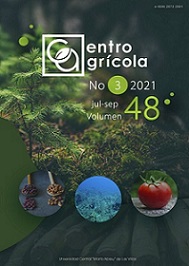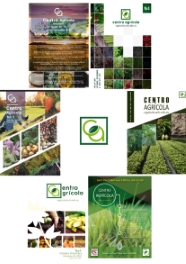CE:1316 CF: cag012172117
RESEARCH ARTICLE
Effect in field of the native strain COL6 of Rhizobium leguminosarum bv. viciae on common bean cv. Percal in Ecuador
Efecto en campo de la cepa nativa COL6 de Rhizobium leguminosarum bv. viciae sobre frijol común cv. Percal en Ecuador
Klever Iván Granda-Mora1, Yelenys Alvarado-Capó2 y Roldán Torres-Gutiérrez1
1Centro de Biotecnología, Universidad Nacional de Loja, Ciudadela Guillermo Falconi, “La Argelia” - PBX: 072547252 - Casilla Letra “S”, Loja, Ecuador. CP 110150
2Instituto de Biotecnología de las Plantas, Universidad Central “Marta Abreu” de Las Villas, Carretera a Camajuaní km 5,5, Santa Clara, Villa Clara, Cuba. CP 54830
E-mail: This email address is being protected from spambots. You need JavaScript enabled to view it.; This email address is being protected from spambots. You need JavaScript enabled to view it.; This email address is being protected from spambots. You need JavaScript enabled to view it.
ABSTRACT
Inoculation with selected Rhizobium strains of common bean (Phaseolus vulgaris L.) contributes to the agricultural yield of this legume, improves soil fertility and reduces the use of nitrogen fertilizers in sustainable agricultural systems. The research aimed to determine the effect in field of the native strain Rhizobium leguminosarum bv. viciae COL6 on growth, N fixation and agricultural yield in common bean cv. Percal. A field trial was carried out to evaluate the parameters of nodulation, biomass, nitrogen fixation, yield components and agricultural yield in common bean. In addition, soil analyzes were performed before and after experimentation. Prior to planting an inoculant was formulated with the strain COL6. The seeds of cv. Percal were mixed in 250 g inoculant per 10 kg of seed and it was sown manually in the soil. The results of growth, N fixation (total N %) and agricultural yield demonstrated the positive effect of inoculation with the bacterial inoculant comparable with chemical fertilizers. The increase in agricultural yield with bacterial inoculant application and chemical fertilization with respect to control was 62 and 64 %, respectively. The results of the soil analysis were variable with respect to the initial physical-chemical characteristics. The promising results of bacterial inoculant use and the effective stimulation in common bean, open the doors for its potential use in Ecuadorian soils and with that the desired potential yield can be reached.





